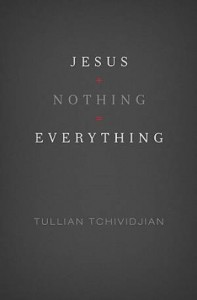 Tullian Tchividjian’s Jesus + Nothing = Everything examines the fundamental truth of the gospel and how to embrace Christ’s finished work for believers. I would not describe it as an exposition of Colossians, but Colossians features prominently. I would not describe it as a spiritual memoir or a particularly personal work, but occasional details of Tchividjian’s difficult year transitioning through a church merger and feelings of inadequacy provide a thread for readers.
Tullian Tchividjian’s Jesus + Nothing = Everything examines the fundamental truth of the gospel and how to embrace Christ’s finished work for believers. I would not describe it as an exposition of Colossians, but Colossians features prominently. I would not describe it as a spiritual memoir or a particularly personal work, but occasional details of Tchividjian’s difficult year transitioning through a church merger and feelings of inadequacy provide a thread for readers.
Readers can think of Tchividjian’s Jesus + Nothing = Everything as a way to recalibrate and assess our functional beliefs and ask ourselves if we are adding anything to the gospel. There are many good books in this stream right now, and I find that a good thing. Like this book asserts, the gospel is not the first step of the Christian life, it’s the hub. We must constantly remind ourselves of the fundamental truths, we never grow out of them. And so reading this book and others like it (Steve Brown’s Scandalous Freedom comes to mind) from time to time is a good exercise for all of us, because we are prone to “think of the gospel as God’s program to make bad people good, not dead people alive” (pg 116.)
Though Jesus + Nothing = Everything is focused on fundamentals, there is a great deal of meaty content to ponder. For example: “Our performancism leads to pride when we succeed and to despair when we fail. But ultimately it leads to slavey either way because it becomes all about us and what we must do to establish our own identity instead of resting in Jesus and what he accomplished to establish it for us” (pg 46). “The gospel alone empowers and emboldens us to press on and strain forward with no anxiety over gaining other people’s sanction or good opinion–even God’s! All the care and love and value we crave–full and final approval–we already have in Jesus” (pg 92.)
The book moves backwards from Everything to Nothing to Jesus, and then forward again. The structure is not bad in itself, but Tchividjian is fairly repetitive. This is a good trick for preaching, to repeat sentences that summarize your point well, but in writing it can feel poorly edited, (e.g. he said that exact same thing three pages ago.) It wasn’t a huge distraction, and it did help me not to miss any critical points, but it was quite noticeable.
Overall, Jesus + Nothing = Everything is a helpful read for any Christian. I’d particularly recommend it for those coming out of more legalistic traditions and trying to overcome those tendencies. As we walk in faith, it is easy to stray into moralism. This book is a reminder of the simplicity of the gospel – that Jesus himself, his life and his work, are worth everything. Nothing in our hands we bring, simply to the cross we cling. May we not forget. (8.5/10)
I received a free copy of this book for review purposes. The opinion expressed is my own.
